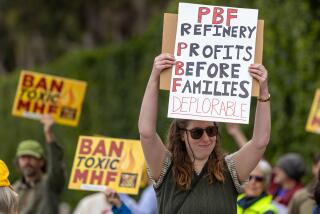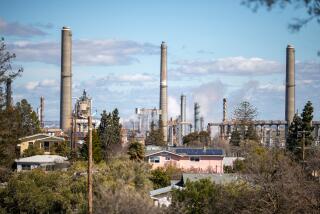Hundreds oppose China refinery project in mostly peaceful protests
BEIJING -- Surrounded and pushed back by police, hundreds of people shouted and marched again in the southern China city of Kunming to protest the construction of a petrochemical plant.
It was the second time this month that demonstrators gathered in large numbers to display their concerns in Kunming, a provincial capital, in what has become a familiar scene in China as citizens demand more accountability for decisions affecting the environment.
The protest crowds Thursday were estimated to number as many as 2,500. Scores of uniformed and riot police looked on and sometimes scuffled with demonstrators, according to photos taken at the scene and comments posted on China’s social media. The rally was mostly peaceful but did not disperse until early evening, shortly after the mayor appeared and addressed the protesters.
Kunming officials have said that the refinery project by the state-owned giant China National Petroleum Corp. will meet environmental standards, but the city and company have refused to make public the environmental impact report.
Residents fear that the plant will pollute the area’s air and water, as well as produce large amounts of paraxylene, a carcinogenic chemical.
The march in Kunming, capital of Yunnan province, is the latest in a string of protests in China over worries about the environmental and health costs of development.
“I think it just demonstrates the gap in the decision-making process,” Ma Jun, a leading environmental expert, said Thursday. “For all these years, the government set growth targets and advanced all these large projects to achieve that, but without public consultation.”
“I think it’s time for China to change, to give far more transparency and give people a chance to participate,” he added.
On Saturday, protesters rallied in Shanghai’s Songjiang district for the third time to oppose the building of a lithium-ion battery plant. The state-run China Daily newspaper said Thursday that public pressure pushed the battery maker to cancel the project.
Analysts aren’t expecting a similar result in Kunming. It’s one thing for a relatively small and unknown battery company to retreat from its plan, but China National Petroleum, also known by its subsidiary PetroChina, is the country’s largest oil producer. The refinery project already has the stamp of approval from the central government, which is keen to boost crucial energy supplies and network.
There is no major refinery in the Kunming area, which is known for its relatively clean air and green environment. That has made the petrochemical plant all the more glaring to residents, even as there is growing demand for oil with many more cars on roads.
After the first protest May 4, local officials and PetroChina held meetings with the public, and Kunming’s mayor also was quoted as saying that the government would call off the project if most of the citizens opposed it.
Despite a police warning posted Monday on its microblog against illegal marches and protests, Kunming authorities allowed the demonstration to proceed. At the same time, references to the protest Thursday on the Twitter-like service Weibo were deleted by government censors.
Photos of the march showed demonstrators holding banners saying things like, “My child needs his health,” and “Dear Premier, please hold justice for the people in Kunming.”
Ma said the situation in Kunming presents a conundrum. Since the protests began, city and company officials have sought to work more with the public. But a lot of trust and credibility was already lost, he said, because that should have been done much earlier in the decision-making process.
“At this stage, hopefully, local government and the developer could be more open and conduct more discussions with targeted communities,” he said, “with far more transparency and eventually some bargaining.”
ALSO:
Judge clears way for fresh investigation of Spanish princess
Taiwan says Filipino apology in fisherman’s death not enough
Afghanistan suicide attack kills 15, including at least two Americans
More to Read
Sign up for Essential California
The most important California stories and recommendations in your inbox every morning.
You may occasionally receive promotional content from the Los Angeles Times.











